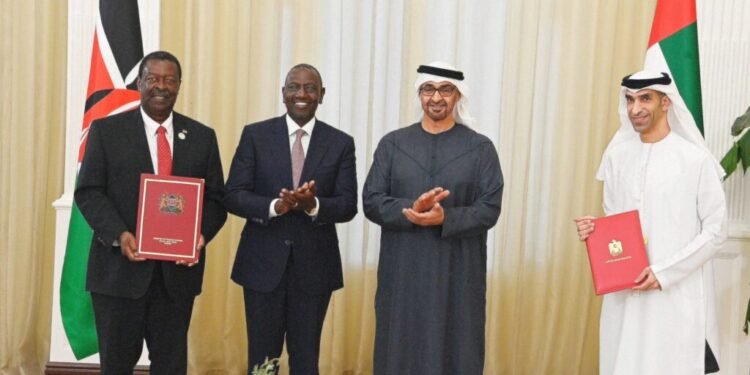- Abu Dhabi is gearing up to invest in Kenya’s critical sectors including ports, logistics, agriculture and energy.
- President William Ruto says the landmark deal will more than triple Kenya’s exports of meat products, fruits, vegetables, cut flowers, tea and coffee to the UAE.
- Agreement also targets the services sector with Kenyan providers in education, transport, construction, and engineering now poised to have a better access to opportunities in the UAE.
Kenya-UAE economic relations are set to enter a new phase following the signing of a deal by authorities in the United Arab Emirates to invest heavily in the East African country’s critical industries including ports, logistics, agriculture and energy.
The agreement, dubbed Kenya-UAE Comprehensive Economic Partnership Agreement (CEPA), is set to redefine trade, investment, and economic partnerships between the two countries. CEPA is part of the Gulf nation’s initiative to step up its foreign investment portfolio, a program that saw it sign similar deals with Malaysia and New Zealand at the ongoing Abu Dhabi Sustainability Week.
Kenya’s President William Ruto and his UAE counterpart Sheikh Mohamed bin Zayed Al Nahyan said CEPA represents the first agreement of its kind between the Gulf country and a mainland African nation.
“The signing of the historic Kenya-UAE Comprehensive Economic Partnership Agreement (CEPA) will deepen trade ties between the two nations by simplifying trade procedures, promoting industrialization and stimulating investment,” noted Dr. Ruto.
He added, “It is expected to more than triple Kenya’s exports of meat products, fruits, vegetables, cut flowers, tea and coffee once implemented. The CEPA will also provide the UAE with investment opportunities in the energy, water, agriculture, health, airports, logistics, and ICT sectors.”
“This aligns with the government’s policy of reducing borrowing while enhancing foreign direct investment and public-private partnerships.”
Target sectors for investment and trade in Kenya-UAE relations
Kenya-UAE trade pact marks a transformative step in deepening bilateral ties. It positions Kenya as a vital gateway to East and Southern Africa, while reaffirming the UAE’s role as a global logistics and financial hub connecting the Middle East, Asia, Europe and beyond. The agreement is modelled to strengthen Kenya-UAE economic collaboration and solidifies Kenya’s standing in the global trade arena.
Leveraging Kenya’s strategic location, the UAE aims to enhance the East African nation’s port infrastructure and logistics capabilities, fostering regional trade and connectivity as part of Abu Dhabi’s investments in critical sectors in the region.
Additionally, UAE’s investments in Kenya’s technology and digital innovation industry is are expected to modernize the country’s digital infrastructure, while promoting efficiency and inclusivity.
Further, agriculture, which is one of Kenya’s economic pillars, stands to benefit significantly from enhanced trade and technology transfer, boosting productivity and exports.
Other critical sectors targeted by the UAE include energy, water, health, airports, and human resource development, all of which contribute to Kenya’s long-term economic transformation.
Kenya-UAE trade performance and opportunities
Statistics show that trade between Kenya and the UAE has seen remarkable growth, doubling over the past decade. In 2023, Kenya’s Ministry of Foreign Trade said bilateral trade reached KES445 billion ($3,44 billion), with Abu Dhabi ranking as Nairobi’s sixth-largest export destination and second-largest source of imports, accounting for 16 per cent of the East African country’s total imports.
Kenya’s exports to the UAE are predominantly agricultural products. During the period under review Nairobi’s meat and meat exports to the UAE totaled KES9.9 billion ($76.45 million), representing over half of Kenya’s total meat exports.
At the same time, pineapples, avocados, mangoes, vegetables, and flowers collectively generated KES10.8 billion ($83.4 million), data from the ministry shows. In return, the Gulf nation supplies Kenya with essential goods such as petroleum, machinery, and chemicals.
CEPA simplifying trade and enhancing value chains
The CEPA’s framework seeks to address persistent trade barriers, simplifies customs procedures, and promotes industrialization and regional value chains. By eliminating obstacles to trade, Kenyan goods and services will have enhanced access to the booming UAE market, while UAE businesses will increasingly gain entry into East Africa’s largest economy.
Crucially, the agreement extends beyond traditional trade to encompass services, whereby Kenyan providers in education, transport, construction, and engineering will better access opportunities in the UAE market.
The CEPA is also tailored to promote digital trade and the transfer of cutting-edge technology even as both nations committed to fostering environmentally responsible practices and clean technologies to ensure sustainable economic growth.
According to Kenya’s Ministry of Foreign Trade, the landmark partnership aligns with Dr. Ruto’s Bottom-Up Economic Transformation Agenda (BETA) blueprint, which focuses on unlocking new markets for priority value chains and attracting foreign investment. It also supports livelihoods across the country by creating jobs, transferring technology, and enhancing the global competitiveness of Kenyan products.
The ministry noted that CEPA further complements Kenya’s trade strategy, which includes agreements like: Kenya-EU Economic Partnership Agreement (2024), Kenya-UK Economic Partnership Agreement (2018), African Continental Free Trade Area (AfCFTA), and the African Growth and Opportunity Act (AGOA) with the US.
Collectively, these initiatives provide Kenya with duty-free, quota-free access to global markets, accounting for nearly half of the world’s GDP.
Positioning Kenya as Africa’s trade gateway
Once rolled out Kenya’s strategic trade agreements, including the Kenya-UAE CEPA, will bolster its role as Africa’s gateway to the world. The country’s duty-free, quota-free access to major global markets enhances its ability to attract investment and drive economic growth. This latest agreement with the UAE further solidifies Kenya’s position as a hub for trade and innovation in the region.
For Kenya, CEPA opens doors to increased foreign investment, expanded market access, and enhanced trade in goods and services. For the UAE, it represents a strategic entry point into Africa’s burgeoning markets.
By fostering stronger bilateral relations and promoting sustainable development, the CEPA sets a precedent for future partnerships between African nations and global economic powers. As global markets take note, the Kenya-UAE agreement signals a new era of economic cooperation, innovation, and shared prosperity.
Read also: UAE readies to champion sustainable health during 2025 Local Production Forum









